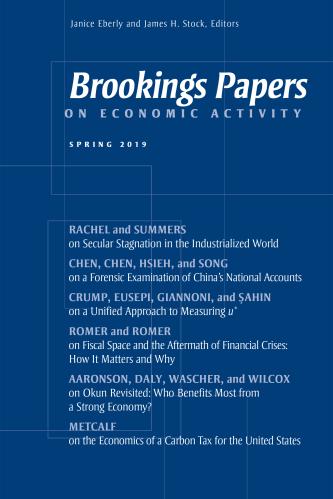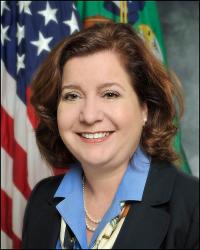This interview is part of the Voices of BPEA series, highlighting women’s leadership in the Brookings Papers on Economic Activity (BPEA), an academic journal published by the Brookings Press twice a year. Each edition of the journal includes five or six new papers on a range of macroeconomic topics currently impacting public policy debates. BPEA is celebrating its 50th anniversary in 2020, and the Spring 2020 conference drafts will be released later this month.
Janice Eberly is a Nonresident Senior Fellow in Economic Studies, the James R. and Helen D. Russell Professor of Finance at the Kellogg School of Management at Northwestern University and co-editor of the Brookings Papers on Economic Activity (BPEA). She previously served as the Assistant Secretary for Economic Policy at the U.S. Treasury from 2011 to 2013, where she led the Office of Economic Policy in analysis of the U.S. and global economies, financial markets, and development of policy recommendations on micro and macroeconomic issues. Her research focuses on finance and macroeconomics.
What has been your experience with BPEA?
I first experienced Brookings and BPEA when I was an assistant professor and I discussed a paper as part of the conference. It exposed me to this mix of credible academic style research with policy implications. In 2014, I wrote a paper for BPEA with a colleague from Northwestern that looked at some of housing policy proposals that were being put forward after the financial crisis and were fairly controversial at the time.
Shortly thereafter, I was invited to be an editor together with James Stock, which has been a real expansion of insight. I already had an impression of how effective and powerful BPEA can be in bringing ideas in economic research to the surface and making them more visible to the rest of the world, but being an editor has been a great opportunity to participate in that process and also to help BPEA use its leadership in this area to choose what ideas to focus on, to bring more people into the process, and to float ideas for policy consideration.
It’s inspiring to see the reach that economics can have.
What has participating in BPEA meant to your career?
I stay in touch with policy topics and the implications of research that have policy relevance more than I would otherwise. It also gives me visibility into many different topics outside my typical purview. I’m a macroeconomist who’s worked mostly on various kinds of investment questions, and here I see people who are working on labor markets, carbon taxes and other topics that are either further away, or where the connections to my own work are more tangential, but no less interesting and important. I find that fascinating and as you get more experience in the profession, you find that things are all connected to each other. It’s inspiring to see the reach that economics can have.
In your opinion, what progress has BPEA already made in diversifying economics, and what else can and should it do going forward?
Today, there’s a more diverse set of people in the room writing for BPEA and I think there are also more diverse topics and methodologies. We’ve had more papers using microdata, which brings in researchers we might not usually see; for example, we had a paper on poverty programs using microdata, and there have been improvements in data availability and technological improvements that facilitate new research. There are many women working on research that uses microdata, and so they become part of BPEA’s community in a way that they wouldn’t have historically. This gives us more diverse voices as we stay modern and up to date with what’s happening in economics.
I think going forward, we always have to be looking in two directions. One is, what’s happening in the economics profession and research that should be filtering into BPEA and has something to say. The policy implications may not be immediate, but it’s still something we want to stay on top of. On the other hand, what are the questions coming out of the policy world that we should be able to speak to, using either the well-understood methodologies that we have, or by bringing in new people, new tools, and new data from the economics professional community.
What would be your advice to women considering a career in economics?
I would say find questions or topics that you’re interested in, curious and passionate about, and then dig into those topics deeply. When policymakers are looking to implement new policy, they really rely on people who have expertise and are knowledgeable, so a great way to have an impact is to be a resource. Being knowledgeable gets you a seat at the table, and one day you’ll be at the head of the table, but you get there by being the person who is knowledgeable and the resource on a topic. Also, be persistent.
Special thanks to Maureen Heydt, who conducted and transcribed these interviews while interning at Brookings in spring of 2019.





Commentary
Janice Eberly on BPEA and the interconnected nature of economic issues
March 4, 2020